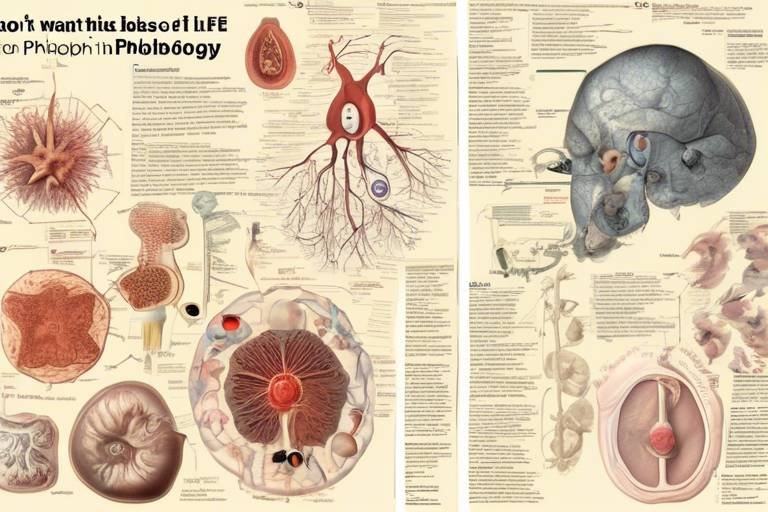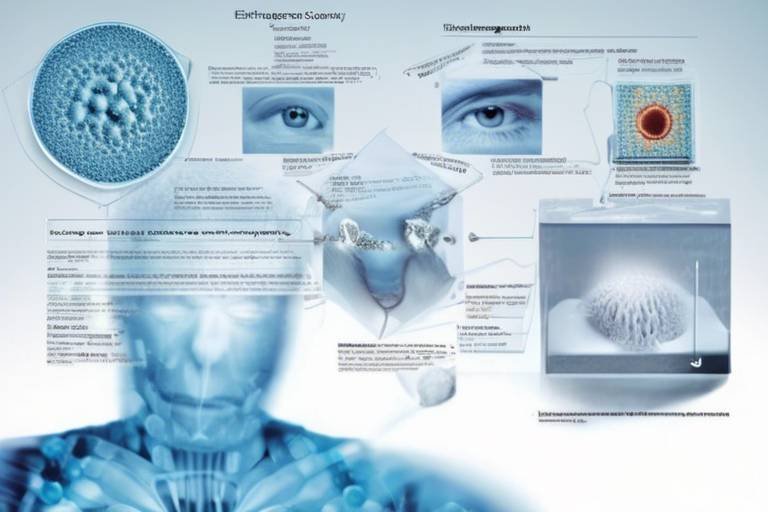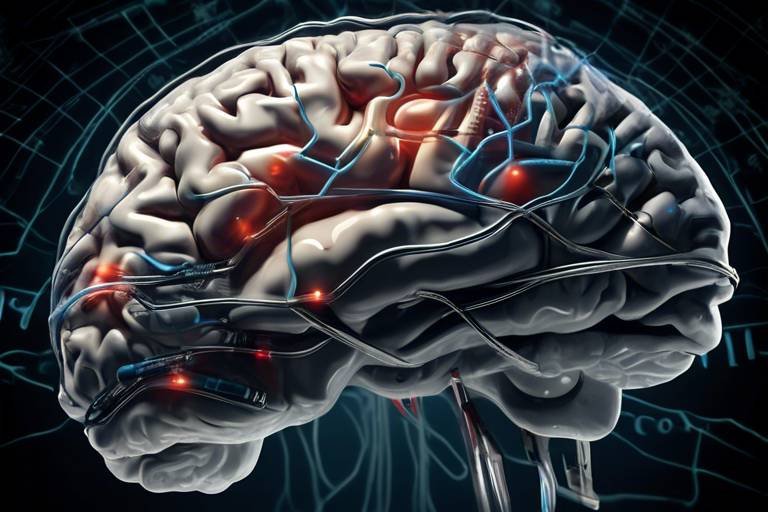Exploring the Basics of Life with Philosophy in Biology
Have you ever stopped to ponder the intricate dance between philosophy and biology? It's like a thrilling tango where each step reveals deeper insights into the very essence of life. This article delves into the intersection of these two fascinating fields, illuminating how philosophical concepts can significantly enhance our understanding of life, existence, and the scientific study of living organisms. Imagine standing at the crossroads of science and thought, where every question leads to a new discovery, and every answer opens the door to even more profound inquiries.
When we explore biology, we aren't just cataloging species or dissecting cells; we're engaging with the fundamental questions of what it means to be alive. Why do we exist? What drives the complex behaviors of living organisms? And how do we ethically navigate the advancements in biological research? These questions are not just for scientists; they are at the heart of philosophical inquiry. By marrying these two disciplines, we can foster a richer understanding of the natural world and our place within it.
As we embark on this journey, we'll uncover the philosophical foundations that support biological sciences, dive into the ethical implications of research, and explore the philosophical debates that surround evolution and existence. Are you ready to challenge your perceptions and expand your horizons? Let's step into this captivating exploration of life through the lens of philosophy.
At the core of biological sciences lies a tapestry woven with philosophical principles. These principles help us grapple with the nature of life, the concept of evolution, and the ethical implications of our research pursuits. Philosophy invites us to consider questions like: What defines life? Is it merely a biological process, or is there something more profound at play? As we dissect these concepts, we find that they not only shape our understanding of biology but also influence how we perceive our own existence.
For instance, the concept of evolution isn't just a scientific theory; it carries with it a wealth of philosophical implications. It challenges us to rethink our place in the universe and our relationship with other living beings. The idea that we share a common ancestry with all life forms can be both humbling and enlightening. It raises questions about our responsibilities towards other species and the environment. Thus, the philosophical foundations of biology are not just academic; they are deeply intertwined with our ethical considerations and our understanding of life itself.
As we navigate the complex waters of biological research, ethics serves as our guiding compass. The ethical considerations researchers must address are vast and varied, ranging from animal rights to the implications of genetic engineering and the environmental impacts of our actions. For example, when we conduct experiments on animals, we must ask ourselves: Are we treating these creatures with the respect they deserve? Are we weighing the potential benefits of our research against the suffering it may cause? This ethical reflection is crucial in ensuring that our scientific pursuits do not come at the cost of moral integrity.
Moreover, the rise of biotechnology presents new ethical dilemmas. As we manipulate the very fabric of life through genetic modification and cloning, we must confront profound questions about the nature of existence and our role as stewards of the planet. Are we playing God, or are we merely enhancing life? These questions are not easily answered and require a deep philosophical inquiry into our values and responsibilities.
- What is the relationship between philosophy and biology?
Philosophy provides a framework for understanding the ethical, existential, and conceptual questions that arise in biological sciences. - Why is ethics important in biological research?
Ethics ensures that research is conducted responsibly and with respect for living beings, balancing scientific advancement with moral considerations. - How can philosophy enhance our understanding of evolution?
Philosophy encourages critical thinking about the implications of evolutionary theory, prompting discussions about our place in the natural world.

The Philosophical Foundations of Biology
When we dive into the world of biology, we often find ourselves grappling with profound questions that extend far beyond the mere observation of living organisms. What does it mean to be alive? This fundamental question is not just a scientific inquiry; it is steeped in philosophical significance. The philosophical foundations of biology encompass a variety of concepts that help us understand the essence of life, the mechanisms of evolution, and the ethical implications of our scientific pursuits.
At the heart of biological inquiry lies the concept of life itself. Biologists strive to define life, yet the task is more complex than it appears. Is life merely a series of biochemical processes, or does it encompass something more? Philosophers have long debated the nature of life, prompting us to consider aspects such as consciousness, purpose, and the interconnectedness of all living beings. This philosophical lens allows us to appreciate life in a holistic sense, rather than merely as a collection of cellular functions.
Another cornerstone of biological philosophy is the theory of evolution. Charles Darwin's groundbreaking work on natural selection not only transformed biology but also sparked philosophical discussions about our place in the universe. Are we merely products of random mutations and environmental pressures, or do we possess a unique purpose? This question leads to a rich tapestry of ideas about adaptation, survival, and the meaning of existence itself. Philosophers like Daniel Dennett and Richard Dawkins have explored these themes, suggesting that understanding evolution can illuminate our human experience.
Furthermore, the ethical implications of biological research cannot be overlooked. As we advance in our understanding of genetics and biotechnology, we face moral dilemmas that challenge our values and beliefs. For instance, the manipulation of genetic material raises questions about the sanctity of life and the boundaries of scientific intervention. Are there limits to what we should alter in the natural world? This inquiry is deeply philosophical, requiring us to weigh the benefits of research against potential ethical consequences.
In summary, the philosophical foundations of biology serve as a framework for exploring the intricate relationship between life and our understanding of it. By integrating philosophical concepts with biological sciences, we enrich our comprehension of existence and the ethical responsibilities that come with scientific advancement. This intersection not only enhances our knowledge but also fosters a deeper appreciation for the complexity of life itself.
- What is the role of philosophy in biology? Philosophy helps us understand the fundamental concepts and ethical implications of biological research.
- How does evolution relate to philosophy? Evolution prompts philosophical questions about our existence, purpose, and the nature of life itself.
- What ethical concerns arise in biological research? Ethical concerns include animal rights, genetic manipulation, and environmental impacts.
- Can philosophy influence scientific research? Yes, philosophical inquiry can guide ethical decision-making and shape scientific directions.

The Role of Ethics in Biological Research
When we dive into the world of biological research, we quickly realize that the quest for knowledge isn't just about discovering new facts or unraveling the mysteries of life. It’s also about grappling with some heavy ethical questions that can make or break a scientific endeavor. Imagine for a moment that you’re a researcher on the brink of a groundbreaking discovery. You’re excited, but then it hits you: what are the implications of your work? This is where ethics comes into play, guiding researchers through the murky waters of moral responsibility.
At the heart of ethical considerations in biology lies the principle of respect for life. This principle challenges us to think critically about the organisms we study and manipulate. For example, when conducting experiments on animals, researchers must weigh the potential benefits of their findings against the suffering they might cause. This raises questions like: Is it justifiable to use animals for research if it could lead to significant advancements in medicine? The answer isn’t straightforward and often sparks heated debates.
Moreover, with the rise of technologies such as genetic engineering and CRISPR, ethical dilemmas have intensified. These advancements allow scientists to edit genes, potentially eradicating diseases but also posing risks of unforeseen consequences. Are we playing God? Are we prepared to handle the ethical ramifications of creating genetically modified organisms (GMOs)? These questions are not just academic; they affect policy-making, public perception, and the future of scientific research.
To better understand the ethical landscape, let’s explore some key areas of concern in biological research:
- Animal Rights: The treatment of animals in research is a hot topic. Researchers must adhere to guidelines that minimize suffering and ensure humane treatment.
- Genetic Engineering: The manipulation of genetic material raises questions about the long-term impacts on ecosystems and human health.
- Environmental Impacts: Research that affects the environment must consider ecological balance and sustainability.
Ethics in biology also extends to human subjects. In fields like medicine and psychology, researchers are bound by strict ethical guidelines that prioritize informed consent and the welfare of participants. This means that before anyone can participate in a study, they must be fully informed about potential risks and benefits. Imagine being a participant in a clinical trial; wouldn’t you want to know exactly what you’re getting into? This is why transparency is vital.
Furthermore, the implications of biotechnological advancements necessitate ongoing ethical discourse. As we develop new technologies, we must ask ourselves: What does it mean to manipulate life? The answers are complex and often lead to more questions. For instance, cloning and synthetic biology push the boundaries of what we consider "natural." Are we enhancing life or undermining its essence? These philosophical inquiries are crucial as they inform the ethical frameworks guiding research.
In conclusion, the role of ethics in biological research is not merely an afterthought but a foundational aspect that shapes the direction and integrity of scientific inquiry. Researchers must navigate a landscape filled with moral dilemmas, ensuring that their pursuit of knowledge does not come at the expense of ethical standards. As we continue to explore the depths of biology, the interplay between science and ethics will remain a pivotal conversation, reminding us that with great power comes great responsibility.
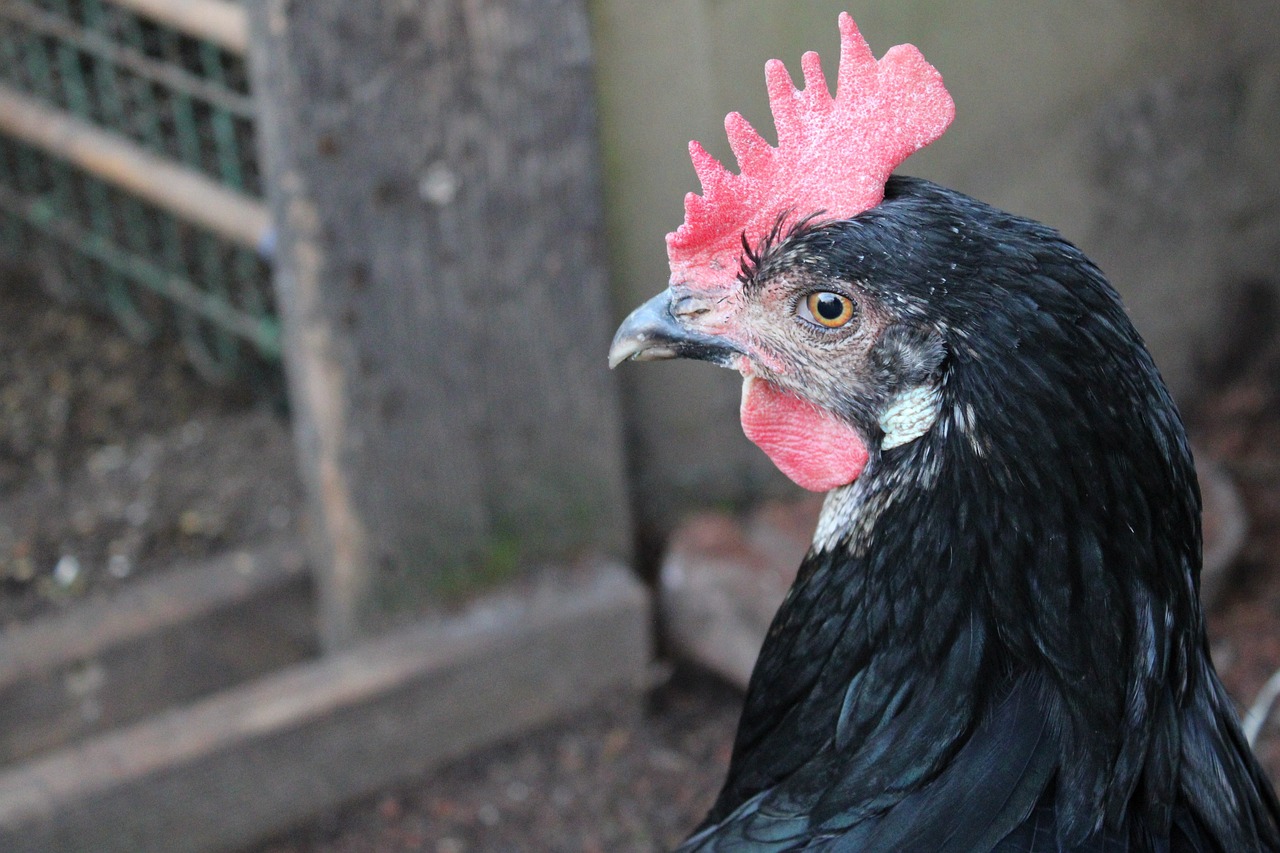
Philosophy of Evolution
The delves deep into the implications of evolutionary theory, challenging our perceptions of life and our place within it. At the heart of this inquiry lies a fundamental question: what does it mean to evolve? The evolutionary process, driven by mechanisms such as natural selection, adaptation, and genetic drift, not only shapes the biological world but also prompts profound philosophical debates about existence, purpose, and identity.
One of the central tenets of evolutionary philosophy is the concept of natural selection, famously articulated by Charles Darwin. This principle posits that organisms better adapted to their environments are more likely to survive and reproduce. But what does this mean for our understanding of progress? Are we merely products of chance, or do we possess an intrinsic purpose? This ongoing debate leads us to consider how evolution impacts our moral frameworks and societal constructs.
Moreover, the implications of evolution extend beyond biology into the realm of human behavior. The question of whether our actions are determined by our genetic makeup or if we possess the free will to choose our paths is a hotly contested philosophical issue. Some argue that our evolutionary history influences our desires, motivations, and even our ethical decisions. For instance, traits such as altruism and cooperation can be seen as evolutionary advantages, yet they also raise questions about the nature of morality itself. Are we good because it is beneficial for our species, or is there a deeper, intrinsic value to our actions?
To illustrate this interplay between biology and philosophy, consider the following table that summarizes key philosophical questions stemming from evolutionary theory:
| Philosophical Question | Implications |
|---|---|
| What is the purpose of evolution? | Challenges the notion of a predetermined purpose in life. |
| Are humans fundamentally different from other species? | Explores the uniqueness of human consciousness and morality. |
| How does evolution inform our understanding of free will? | Examines the balance between genetic influence and personal choice. |
In addition to these questions, the philosophy of evolution also raises important ethical considerations. For example, as we uncover more about our evolutionary past, we must confront the implications of genetic engineering and biotechnology. If we can manipulate our genetic code, what responsibilities do we have to future generations? This intersection of ethics and evolution is a rich area for philosophical exploration, as it forces us to consider the consequences of our actions on both a personal and societal level.
Ultimately, the philosophy of evolution invites us to reflect on our existence and the intricate tapestry of life that surrounds us. It challenges us to think critically about the nature of change, the significance of our choices, and the interconnectedness of all living beings. As we continue to explore these profound questions, we not only deepen our understanding of biology but also enrich our perspectives on what it means to be alive.
- What is the philosophy of evolution? The philosophy of evolution examines the implications of evolutionary theory on our understanding of life, existence, and human behavior.
- How does natural selection relate to philosophy? Natural selection raises questions about purpose, morality, and the nature of progress within the context of evolution.
- What ethical considerations arise from evolutionary theory? Ethical considerations include the implications of genetic engineering, the responsibilities towards future generations, and the nature of human behavior.

Biological Determinism vs. Free Will
When we dive into the deep waters of biological determinism and free will, we're essentially wrestling with one of the oldest philosophical debates known to humanity. On one side, we have the idea that our genes and biological makeup dictate who we are, influencing our behavior, choices, and even our destinies. Imagine being a puppet, with strings pulled by your DNA, where every action you take is preordained by your genetic code. This perspective, often championed by proponents of biological determinism, suggests that our environment and upbringing play second fiddle to our biology.
On the flip side, we have the notion of free will, which posits that we are not mere products of our biology, but rather, we possess the ability to make choices independent of our genetic predispositions. This idea is akin to being the captain of your own ship, navigating through the turbulent seas of life with the power to steer your course, regardless of the winds that may blow from your genetic background. The tension between these two ideas raises profound questions: Are we truly in control of our actions, or are we simply following a path laid out by our biological inheritance?
To better understand this intricate relationship, let’s explore some key points:
- Genetic Influence: Research has shown that certain behaviors, such as aggression or risk-taking, can be linked to specific genes. This suggests that our biology can indeed play a significant role in shaping our actions.
- Environmental Factors: While biology lays the groundwork, our experiences, culture, and environment can modify or even override biological impulses. Think of it like a garden; while the soil (biology) provides the foundation, the gardener (environment) decides how the plants (behaviors) grow.
- Philosophical Implications: If our actions are determined solely by biology, what does that mean for concepts like morality, accountability, and justice? Can we truly hold someone responsible for their actions if those actions are merely the result of their genetic makeup?
Interestingly, the debate isn’t black and white; many philosophers and scientists advocate for a middle ground, suggesting that both biological and environmental factors interact in complex ways to shape human behavior. This perspective aligns with the idea of epigenetics, where environmental factors can influence gene expression, creating a dynamic interplay between our biology and our choices.
In conclusion, the discourse surrounding biological determinism and free will is not just an academic exercise; it resonates with our everyday lives. It challenges us to reflect on our own decisions: Are we truly making choices, or are we merely responding to the biological scripts written in our DNA? This ongoing dialogue continues to shape our understanding of human nature, inviting us to explore the vast landscape of what it means to be human.
- What is biological determinism? Biological determinism is the belief that human behavior is primarily shaped by genetic factors, suggesting that our biology dictates our actions and choices.
- What is free will? Free will is the philosophical concept that individuals have the power to make choices independent of any biological or environmental constraints.
- Can both concepts coexist? Yes, many scholars believe that both biological determinism and free will can coexist, as human behavior is influenced by a complex interplay of genetics and environment.
- How does epigenetics relate to this debate? Epigenetics studies how environmental factors can influence gene expression, suggesting that our biology is not fixed and can be altered by our experiences.

The Meaning of Life in Biological Contexts
When we ponder the meaning of life, we often find ourselves grappling with profound questions that touch on existence, purpose, and the very essence of being. From a biological standpoint, the inquiry takes on unique dimensions. After all, life is not just a series of biological processes; it is a tapestry woven from the threads of evolution, adaptation, and survival. So, what does it mean to be alive in a world governed by natural laws? Is our existence merely a product of chance, or is there a deeper significance?
To begin with, we must acknowledge that life, in its biological context, can be viewed through various lenses. One perspective is that of survival and reproduction. In the grand scheme of evolution, organisms are driven by the imperative to survive and pass on their genes. This instinctual drive raises the question: if our primary purpose is to reproduce, does that diminish the richness of our experiences? Or does it enhance our understanding of life's complexities?
Moreover, the concept of consciousness adds another layer to this exploration. As humans, we possess a unique ability to reflect on our existence, to question our purpose, and to seek meaning beyond mere survival. This self-awareness allows us to ponder not just our biological functions but also our emotional and intellectual experiences. Are we, then, merely biological machines, or do we transcend our biological origins through thought and creativity?
In examining the meaning of life from a biological perspective, we can identify several key themes:
- Interconnectedness: All living organisms are part of a vast ecosystem, highlighting the importance of relationships and dependencies in the web of life.
- Adaptation: The ability to adapt to changing environments is crucial for survival, suggesting that flexibility and resilience are vital components of life's meaning.
- Consciousness: Our capacity for self-reflection and emotional depth allows us to seek purpose beyond biological imperatives.
These themes underscore the intricate relationship between biology and philosophy. For instance, the interconnectedness of life can lead to ethical considerations about how we treat other beings and our environment. It invites us to consider our responsibilities as stewards of the planet. Similarly, the notion of adaptation prompts us to think about how we can evolve not just biologically but also socially and ethically.
Furthermore, the search for meaning often intersects with questions about consciousness. What does it mean to be aware, to feel, and to experience joy or suffering? These questions challenge us to consider the implications of our biological makeup on our emotional and intellectual lives. Are our feelings merely chemical reactions, or do they hold a deeper significance?
In conclusion, exploring the meaning of life through biological contexts invites us to delve into the very essence of what it means to exist. It encourages us to embrace the complexities of life while recognizing the biological imperatives that shape our experiences. Ultimately, the intersection of biology and philosophy enriches our understanding of ourselves and the world around us, prompting us to seek a more profound meaning in our lives.
- What is the biological definition of life? Life is typically defined by characteristics such as growth, reproduction, response to stimuli, and metabolism.
- How does evolution influence our understanding of life's meaning? Evolution provides a framework for understanding how organisms adapt and survive, prompting questions about purpose and existence.
- Can biological perspectives inform ethical considerations? Yes, understanding our biological interconnectedness can lead to more responsible ethical decisions regarding the environment and other living beings.

Interdisciplinary Approaches to Biology and Philosophy
In recent years, the intersection of biology and philosophy has gained significant attention, as scholars and researchers recognize the value of an interdisciplinary approach. This fusion of two seemingly distinct fields can lead to a deeper understanding of complex biological phenomena and the ethical implications surrounding them. When we think about biology, we often focus on the tangible aspects—cells, organisms, ecosystems—but what about the underlying philosophical questions that shape our understanding of these biological processes? By integrating philosophical inquiry into biological research, we can not only enhance our scientific knowledge but also address the ethical dilemmas that arise in the study of life.
One of the most compelling aspects of this interdisciplinary approach is its ability to foster innovative solutions to pressing biological problems. For example, consider the current challenges in conservation biology. While biologists may focus on species preservation and habitat restoration, philosophers can contribute by questioning the ethical frameworks that guide these efforts. Should we prioritize certain species over others? What are our moral obligations to non-human life? By engaging in these discussions, we can create more comprehensive conservation strategies that respect both the scientific and ethical dimensions of biodiversity.
Moreover, the dialogue between biology and philosophy can illuminate the concept of life itself. Philosophers have long debated what it means to be "alive," and as biological science uncovers new forms of life—such as extremophiles and synthetic organisms—these discussions become increasingly relevant. For instance, how do we define life in the context of synthetic biology? Are artificially created organisms entitled to the same moral consideration as naturally occurring ones? These questions challenge us to rethink our definitions and assumptions, leading to a richer understanding of life in all its forms.
Another area where this interdisciplinary approach shines is in the realm of biomedical ethics. As advancements in genetics and biotechnology open up new possibilities for treatment and enhancement, the philosophical implications become paramount. Issues such as genetic engineering, cloning, and personalized medicine raise profound questions about identity, autonomy, and the nature of human enhancement. By incorporating philosophical perspectives, we can better navigate these uncharted waters, ensuring that our scientific endeavors align with ethical standards that reflect our values as a society.
Furthermore, interdisciplinary studies can inspire a new generation of thinkers who are equipped to tackle the multifaceted challenges of the future. Educational institutions are beginning to recognize the importance of teaching biology alongside philosophy, encouraging students to explore the connections between science and ethics. This holistic approach not only enriches students' academic experiences but also prepares them to engage thoughtfully with the complex issues they will encounter in their careers. As the world faces unprecedented biological challenges, from climate change to pandemics, the need for interdisciplinary thinkers has never been more critical.
In conclusion, the integration of biology and philosophy offers a promising avenue for addressing the complexities of life and existence. By fostering dialogue between these disciplines, we can enhance our understanding of biological phenomena while grappling with the ethical implications that accompany them. As we move forward, it is essential to embrace this interdisciplinary approach, ensuring that our scientific advancements are guided by thoughtful philosophical inquiry. This synergy not only enriches our knowledge but also cultivates a more responsible and reflective society.
- What is the significance of combining biology and philosophy?
The combination allows for a deeper understanding of biological phenomena and addresses ethical implications, leading to more comprehensive solutions to complex problems. - How can philosophy influence biological research?
Philosophy can guide ethical considerations in research, helping scientists navigate moral dilemmas related to topics like genetic engineering and conservation. - What are some examples of interdisciplinary studies in biology and philosophy?
Examples include conservation ethics, biomedical ethics, and discussions surrounding the definition and implications of synthetic life.
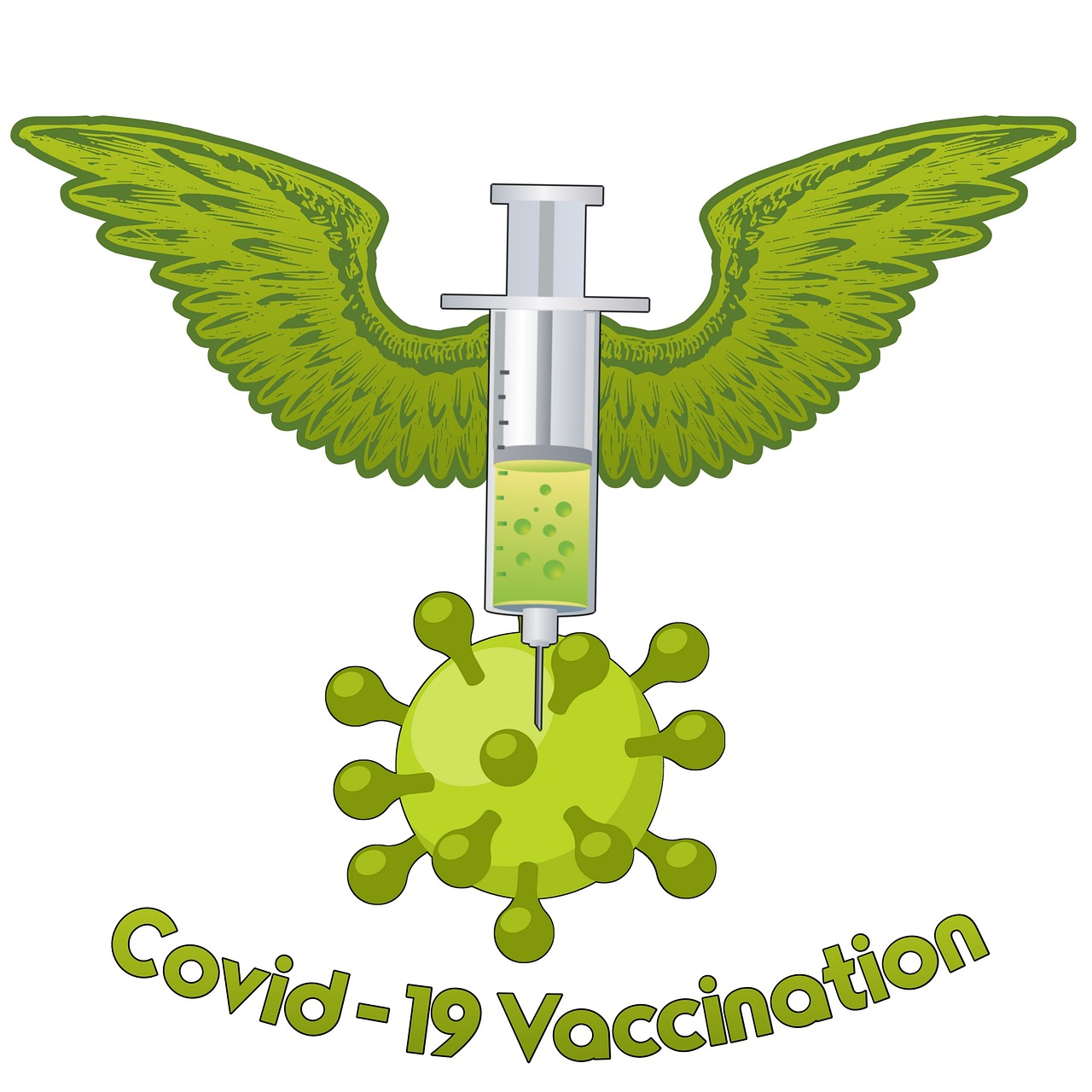
Philosophical Implications of Biotechnology
Biotechnology is a fascinating field that straddles the line between science and ethics, raising profound philosophical questions about the nature of life itself. As we delve into the intricacies of genetic modification, cloning, and synthetic biology, we find ourselves at a crossroads where science meets morality. The ability to manipulate living organisms has opened up a Pandora's box of possibilities, but with these possibilities come significant ethical dilemmas that challenge our understanding of what it means to be human.
At the heart of the philosophical implications of biotechnology lies the question of identity. When we alter the genetic makeup of an organism, are we still dealing with the same entity, or have we created something entirely new? This question is particularly poignant in the realm of cloning. Cloning not only raises issues about the individuality of the cloned organism but also provokes deeper inquiries about the essence of life. Are clones mere copies, or do they possess their own unique identities? This debate often leads to discussions about the moral status of clones and whether they should be afforded the same rights as naturally occurring beings.
Another critical aspect of biotechnology is the concept of playing God. As scientists gain the ability to edit genes and create life forms, some argue that we are overstepping natural boundaries. This perspective invokes a sense of caution, warning against the hubris of assuming we can fully understand and control the complexities of life. The philosophical implications here are vast, as they touch upon our place in the universe and the responsibilities that come with such power. Are we prepared to face the consequences of our actions, especially when they could lead to unforeseen ecological or societal impacts?
Moreover, the ethical considerations surrounding biotechnology extend into the realm of environmental stewardship. Genetic engineering, particularly in agriculture, raises questions about biodiversity and the long-term effects of introducing genetically modified organisms (GMOs) into ecosystems. While proponents argue that GMOs can lead to increased food security, critics caution that we might be sacrificing ecological balance for short-term gains. This tension highlights the need for a philosophical approach to biotechnology that considers not only human benefits but also the broader implications for the planet.
To further illustrate these philosophical implications, consider the following table that outlines some key ethical questions associated with various biotechnological advancements:
| Biotechnological Advancement | Key Ethical Questions |
|---|---|
| Genetic Engineering | What are the long-term effects on human health and the environment? |
| Cloning | Do clones have rights? What does it mean for individuality? |
| Synthetic Biology | Are we creating life or merely manipulating existing life forms? |
| CRISPR Technology | How do we regulate gene editing in humans? What are the implications for future generations? |
As we navigate this ever-evolving landscape, it's essential to engage in open dialogue about the ethical frameworks that should guide biotechnological research and application. Philosophers, scientists, and ethicists must collaborate to ensure that the advancements we make in biotechnology are not only innovative but also responsible. The future of biotechnology holds immense promise, but it is our philosophical inquiries that will shape how we harness this power ethically and sustainably.
- What is biotechnology? Biotechnology is the use of living systems and organisms to develop or make products, often involving genetic manipulation.
- What are the ethical concerns surrounding biotechnology? Ethical concerns include issues of identity, environmental impact, and the moral implications of altering life forms.
- How does cloning raise philosophical questions? Cloning raises questions about individuality, rights, and the essence of life itself.
- What role does philosophy play in biotechnology? Philosophy helps us navigate the moral implications of biotechnological advancements and guides ethical decision-making.

The Future of Philosophy in Biological Sciences
As we stand on the brink of groundbreaking advancements in biological sciences, the intersection of philosophy and biology is becoming increasingly relevant. The future of this relationship is not just intriguing; it's essential. Imagine a world where ethical dilemmas surrounding genetic engineering, cloning, and synthetic biology are not merely debated in scientific circles, but are also deeply examined through a philosophical lens. This integration could lead to more responsible and reflective practices in the life sciences, ensuring that scientific progress does not come at the expense of ethical considerations.
One of the most exciting prospects for the future is the potential for interdisciplinary collaboration. By fostering partnerships between biologists, ethicists, and philosophers, we can create a robust framework that addresses the complexities of modern biological challenges. For instance, consider the rapid advancements in gene editing technologies like CRISPR. The potential to eradicate genetic diseases is phenomenal, but it raises profound questions about the nature of "playing God." How do we navigate the moral landscape of such powerful technologies? Here, philosophical inquiry becomes crucial, guiding us through the murky waters of ethics and responsibility.
In addition, the rise of artificial intelligence in biological research presents another layer of philosophical inquiry. As AI systems become more sophisticated in analyzing biological data, we must ask ourselves: What does it mean for a machine to "understand" life? Can an algorithm truly grasp the essence of biological phenomena, or is there an irreplaceable aspect of human intuition and insight? These questions not only challenge our understanding of intelligence but also compel us to consider the implications of delegating critical decisions to machines.
Moreover, the future of philosophy in biological sciences will likely involve a greater emphasis on public engagement. As scientific advancements increasingly affect everyday lives, the role of philosophy will be to bridge the gap between complex scientific concepts and public understanding. Imagine a scenario where community discussions are held to deliberate on the implications of biotechnological advancements, allowing diverse voices to contribute to the decision-making process. This democratization of science can lead to more inclusive policies that reflect societal values and norms.
To illustrate the multifaceted future of philosophy in biological sciences, consider the following key areas where philosophical inquiry will play a pivotal role:
| Area of Focus | Philosophical Questions |
|---|---|
| Genetic Engineering | What ethical guidelines should govern gene editing? Who decides which traits are desirable? |
| Cloning | What does it mean to clone a living being? Are clones entitled to the same rights as naturally born organisms? |
| Synthetic Biology | How do we define "life"? Can synthetic organisms be considered alive? |
| Artificial Intelligence | Can AI truly understand biological processes? What ethical considerations arise from its use in research? |
Ultimately, the future of philosophy in biological sciences is a landscape rich with possibilities. As we navigate through the challenges and opportunities presented by advancements in biology, philosophical inquiry will be our compass, guiding us toward ethical and thoughtful decision-making. The dialogue between these two fields will not only enrich our understanding of life but also ensure that our scientific endeavors align with our values as a society.
- What is the role of philosophy in biological sciences?
Philosophy helps to address ethical dilemmas, guiding responsible practices in the life sciences. - How can interdisciplinary collaboration enhance biological research?
By combining insights from biology and philosophy, researchers can tackle complex ethical issues more effectively. - What are some ethical concerns surrounding genetic engineering?
Key concerns include the implications of "playing God" and the potential for designer babies. - Why is public engagement important in biological sciences?
Engaging the public fosters inclusivity, ensuring diverse perspectives are considered in scientific decision-making.
Frequently Asked Questions
- What is the relationship between philosophy and biology?
Philosophy and biology intersect in many intriguing ways. Philosophy helps us question the fundamental principles of life, existence, and the nature of living organisms. By applying philosophical concepts, we can gain deeper insights into biological phenomena, such as evolution, ethics, and the meaning of life itself.
- How does ethics influence biological research?
Ethics is crucial in guiding biological research, ensuring that scientists consider the moral implications of their work. This includes addressing issues like animal rights, the impact of genetic engineering, and environmental consequences. Ethical frameworks help researchers navigate complex dilemmas, fostering responsible scientific practices.
- What are the philosophical debates surrounding evolution?
The philosophy of evolution raises significant questions about natural selection and adaptation. Philosophers debate the implications of evolutionary theory on our understanding of humanity, existence, and even our moral responsibilities. These discussions challenge us to think critically about our place in the natural world and the meaning of our evolutionary journey.
- Can biology determine our behavior?
This question dives into the tension between biological determinism and free will. While our genetic makeup undoubtedly influences our behavior, philosophical inquiries urge us to consider the extent of this influence. Are we merely products of our biology, or do we possess the agency to shape our lives beyond genetic predispositions?
- How can biological perspectives inform the meaning of life?
Biological perspectives offer unique insights into life's purpose, encouraging us to explore questions about existence and consciousness. By examining the significance of living organisms and their interactions, we can develop a richer understanding of what it means to be alive and the roles we play within the broader ecosystem.
- What are interdisciplinary approaches in biology and philosophy?
Interdisciplinary approaches combine the strengths of both biology and philosophy, leading to innovative solutions to complex problems. By merging these fields, researchers can tackle issues like environmental sustainability and bioethics more effectively, resulting in richer insights and a holistic understanding of life sciences.
- What philosophical questions arise from biotechnology?
Biotechnology raises profound philosophical questions about the manipulation of life. Issues surrounding genetic modification, cloning, and synthetic biology challenge our understanding of nature and ethics. These discussions prompt us to consider the moral implications of altering life forms and the responsibilities that come with such power.
- What is the future of philosophy in biological sciences?
The future of philosophy in biological sciences is promising, as the two fields continue to intersect. Emerging biological challenges and ethical dilemmas will require philosophical inquiry to navigate. As science advances, philosophical perspectives will be essential in addressing the complexities of life and the ethical considerations that arise from new discoveries.

